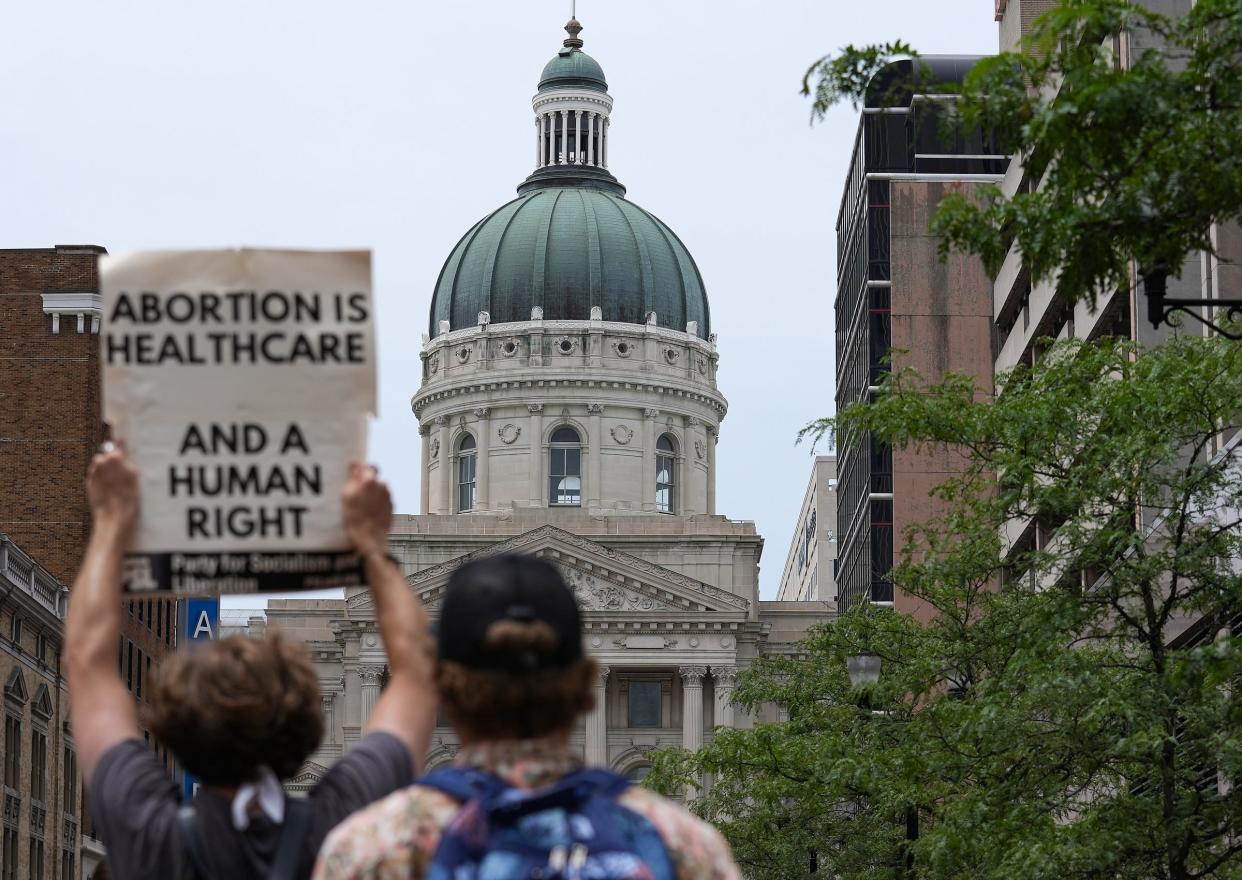What to know about the Roe v. Wade decision and what it means for Indiana

On Friday, the Supreme Court issued a decision declaring there is no constitutional right to an abortion and overturning the landmark 1973 ruling in Roe v. Wade.
Here's what Indiana residents should know about the decision and what could happen next:
What did the Supreme Court decide?
The Supreme Court's decision was in the case Dobbs v. Jackson Women's Health Organization.
Dr. Thomas Dobbs, Mississippi's top public health official, is named in the case against the Jackson Women's Health Organization, a health clinic in the state's capital.
The case was brought against Mississippi for a law banning abortions after 15 weeks. Both the Southern District of Mississippi and the U.S. Court of Appeals previously ruled in favor of the clinic, saying the state's law was unconstitutional.
More: How access to abortions has changed in Indiana since Roe v. Wade
However, the Supreme Court's decision Friday ruled in favor of the state 6-3, upholding the Mississippi law.
However, the court went further than upholding Mississippi's law. In a 5-4 decision, the court voted to go further and overturn rulings in both the 1973 Roe v. Wade and the 1992 Planned Parenthood v. Casey cases.
"Roe was egregiously wrong from the start," Associate Justice Samuel Alito wrote in the majority opinion. "Its reasoning was exceptionally weak, and the decision has had damaging consequences."
"The Constitution does not confer a right to abortion; Roe and Casey are overruled; and the authority to regulate abortion is returned to the people and their elected representatives," the decision read.
What does Roe V. Wade being overturned mean for Indiana?
Indiana's abortion laws have gotten more restrictive over the years.
There are currently restrictions on when an abortion can occur and actions surrounding the procedure.
Abortions can only be performed within the first 20 weeks "postfertilization," according to Indiana law, which amounts to 22 weeks after the last menstrual cycle.
People under 18 must get the consent of their parents or legal guardians before getting an abortion.
The pregnant person must receive counseling at least 18 hours before the procedure, which can include an ultrasound and offering to let the person listen to the heartbeat of the fetus.
They must also be told that "human physical life begins when a human ovum is fertilized by a human sperm," according to an Indiana law.
More: Abortion is still legal in Indiana — for now. Here's what is and isn't allowed.
Is abortion still legal in Indiana?
Yes, as of now.
Some states have "trigger laws," or legislation passed to limit or outlaw abortion when Roe v. Wade was overturned. Indiana is not one of them.
However, abortion will be addressed in an upcoming special session of the Indiana General Assembly, Gov. Eric Holcomb confirmed Friday.
More: Indiana poised to limit abortion access after Supreme Court ruling overturning Roe v. Wade
How many people get abortions in Indiana?
In 2020, the most recent available data, 7,756 abortions were performed in Indiana. Of that number, 7,372 were Indiana residents, according to data provided by the Indiana Department of Health.
The number of people traveling out of state to get abortions has also dramatically increased over time. In 2010, about 13% of Indiana residents who had abortions left the state to have the procedure.
By 2019, that figure had increased to 29%, Heidi Moseson, a senior research scientist at Ibis Reproductive Health, a global research organization, said.
More: Indiana abortions by the numbers
What will happen next?
Holcomb had previously called a special session of the Indiana General Assembly on July 6 to send $1 billion back to Indiana residents to combat inflation.
More: Holcomb calls special session in July, Indiana lawmakers could pass abortion restrictions
However, that's not all that will be getting addressed. Holcomb said Friday he expects lawmakers will address the issue during the special session.
"The Supreme Court’s decision is clear, and it is now up to the states to address this important issue. We’ll do that in short order in Indiana," the statement read. "I have been clear in stating I am pro-life. We have an opportunity to make progress in protecting the sanctity of life, and that’s exactly what we will do."
IndyStar reporters Kaitlin Lange, Johnny Magdaleno and Shari Rudavsky contributed to this report.
Contact IndyStar trending reporter Claire Rafford at crafford@gannett.com or on Twitter @clairerafford.
This article originally appeared on Indianapolis Star: Roe v. Wade overturned: What does it mean for Indiana?

